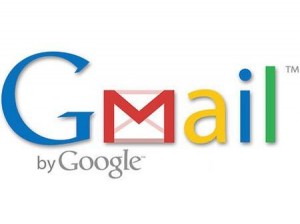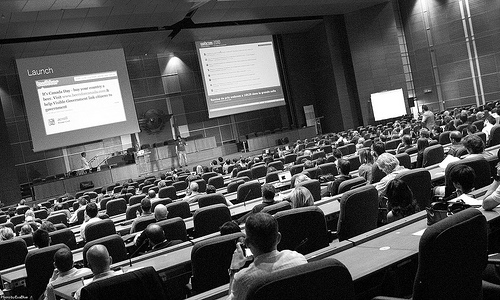webcom Montreal
I’m speaking on Death and Digital Legacy today at webcom Montreal. The line up from the social media world is incredible – Jimmy Wales, founder of wikipedia, Tara Hunt, Julien Smith, Chris Heuer, Kristie Wells, Jeff Pulver and loads of other people who are at the forefront of the profession. Kindly, before my session the team were kind enough to interview me.
I’ll follow up with more from the conference after I present and have a moment to breathe.
(The next day…)
What a great conference! My thanks to Claude Malaison and the producers of webcom Montreal for a really well-run event. It was quite an experience to speak on that BIG stage, with the UN emblem behind me.
(That’s the brilliant Sean Power on stage talking about social media analytics.)
Feedback on my session was good and I hope that I got the audience thinking about their own digital legacy and who they might assign as their digital executor.
Thanks to everyone who came out to my session.
First Digital Death Day A Success
From all signs, it appeared that today’s Digital Death Day was a great success. The first (un)conference dedicated to death and technology drew 30 participants, including sponsors Legacy Locker, Entrustet and Data Inherit – all services catering to people who want a secure way to pass on the their digital assets after they’ve died.
Twenty sessions were proposed, including:
Session notes will be available in the next few days. In the meantime, you can check out the highlights of the day from the Twitter back channel.
Digital Death Day in Silicon Valley
![]() Last month at the SXSW Interactive festival, I learned of the Digital Death Day unconference happening on May 20 at the Computer History Museum in Mountain View, California. This is the first unconference dedicated to discussing the ideas of death online, whether that entails wanting to claim your own information and delete it, or, what happens to your digital identity online when you physically die.
Last month at the SXSW Interactive festival, I learned of the Digital Death Day unconference happening on May 20 at the Computer History Museum in Mountain View, California. This is the first unconference dedicated to discussing the ideas of death online, whether that entails wanting to claim your own information and delete it, or, what happens to your digital identity online when you physically die.
From their site:
Death is a part of life but what does death of the physical self mean for the digital self?
This is a conference focused on this question and others around “digital death”.
- What does it mean for loved ones of the departed?
- What does it mean for professionals in end of life care and post mortem services?
- What does it mean for online tool and service providers?
- What does it mean for estate and legacy planners?
- What do people do to prepare for their own deaths in relationship to their online life?
- What do friends and relatives do with the digital assets of a loved one when they die? What if aspects of their online life were secret or just not understood?
- What does it mean for governments and public records?
- What businesses are serving this market?
The Digital Death Day unconferenced has been added on to the end of the 10th Internet Identity Workshop, running from May 17 to 19 and founded by Kaliya Hamlin (@IdentityWoman). Kaliya is a pioneer in the identity community, co-producing the IIW with Phil Windley and Doc Searls. She is also fellow if the Information Card Foundation, one of the few members of the Open Web Foundation and a member of the OpenID Foundation.
It’s great to see Kaliya take a leading role in bringing this discussion, not only to the identity community, but to silicon valley where so many of the decisions about online policy, services and products are made.
This conference is aimed at:
- People planning their Digital Wills
- Online Social Networks
- Companies offering services for digital afterlife management
- Death Care Professionals
- Estate Planners
- Legacy Planners
- End of Life Planners
- Death Attorneys
- Hospice volunteers
Registration for Digital Death Day is open now. Follow @DigitalDeathDay on Twitter.
Australia: Unwitting Law Firms and Digital Undertakers
I recently discovered this very well produced and funny video from Hungry Beast, a weekly topical show on the Australian Broadcasting Corporation (ABC).
As technologies move so quickly, the law is often slow to keep up. In the U.S., some law firms are advising their clients to leave instructions on their digital selves in their wills. But, not here in Australia. We spoke to ten firms, and none of them had even thought about it yet. But, they did all say, “Thanks for the heads up.”
As more and more of our lives take place online, it’s likely that we’ll see the rise of the Digital Undertakers. Companies employed to scour the web after you die to eradicate the more sensitive parts of your online self, ensuring that you leave the impression you want to in the everlasting digital afterlife.
What do you think? Do you think we’ll see “the rise of the Digital Undertakers?” Please let me know in the comments.
Prepping Digital Assets and Emru Townsend
 I was very happy to have been interviewed by journalist Amy Dempsey for the Canadian Press article “Prepping digital assets for the great off-line.” Even more gratifying was introducing Amy to Tamu Townsend, champion of bone marrow donation, who’s story of her brother Emru was featured in the piece. I met Tamu last year when I was organizing Twestival Montreal, but I had learned of Emru’s struggle via Twitter many months before that. I’m grateful to Tamu for taking the time last summer to talk to me about Emru, his life and death, and her struggle to gain access to his online accounts. It’s a story I tell frequently when I speak about the many issues surrounding death and digital legacy.
I was very happy to have been interviewed by journalist Amy Dempsey for the Canadian Press article “Prepping digital assets for the great off-line.” Even more gratifying was introducing Amy to Tamu Townsend, champion of bone marrow donation, who’s story of her brother Emru was featured in the piece. I met Tamu last year when I was organizing Twestival Montreal, but I had learned of Emru’s struggle via Twitter many months before that. I’m grateful to Tamu for taking the time last summer to talk to me about Emru, his life and death, and her struggle to gain access to his online accounts. It’s a story I tell frequently when I speak about the many issues surrounding death and digital legacy.
For more:
Prepping digital assets for the great off-line
Pass the Slaw
 Fellow social media professional, Connie Crosby, has just posted the interview that she did with me about Death and Digital Legacy for Slaw.ca. Slaw is a Canadian co-operative blog for practicing lawyers, legal librarians, legal academics and students.
Fellow social media professional, Connie Crosby, has just posted the interview that she did with me about Death and Digital Legacy for Slaw.ca. Slaw is a Canadian co-operative blog for practicing lawyers, legal librarians, legal academics and students.
The interview, taken from a telephone conversation last December, gives an overview of some of the discussion points around digital legacy.
If you are a lawyer or notary who deals with estate planning, wills or copyright, I’d love to speak with you about digital legacy. Please contact me at adele |at| deathanddigitallegacy |dot| com
Thanks!
HOW TO: Use Gmail For Digital Executor Instructions and Access
DIGITAL WISHES AND ACCESS
In another post, I talked about assigning a digital executor to manage your online accounts and digital content after you pass. Often the next question is, how will your digital executor know your wishes? And how will they gain access to your accounts?
I gave you some ideas in the article in The New York Times on The Digital Afterlife that involved keeping track of all your accounts and placing the information in an encrypted file, sealed envelope or safety deposit box. These options are the most viable for people who don’t have a very large digital footprint, who don’t change or add account information often, or who have basic needs. For people who are very active online, documenting accounts and passwords on paper may become unruly to manage and become out of date easily. To address this, some online paid services offer the ability to notify designated people of your passing, forward your final instructions or messages and safeguard your logins and passwords.
But, I’ve come up with an easy and free way to handle all of your instructions, logins and passwords while keeping the information safe and secure: Gmail.
SET-UP
 STEP 1: Create a Gmail executor account to house all of the account information and specific instructions for your digital executor.
STEP 1: Create a Gmail executor account to house all of the account information and specific instructions for your digital executor.
STEP 2: Take an inventory of all of the digital assets you would like managed in some way after your passing. For instance, blogs, web sites, photo sharing sites, social networks, affiliate accounts, etc. Include on the list all of the email addresses you have registered and use on a regular basis along with their passwords. Don’t forget passwords to computers and the names or locations of important files on your hard drive.
STEP 3: For each asset, send an email to the Gmail executor account with the name of the asset in the subject line. In your email, include a link to the service, user name, and password. Also include the email address that the online service is registered to and its password (your executor may need access your email account to receive confirmation and notification emails, or to reset any online service passwords.) Finally, in the email, include the instructions to your executor of what you would like to happen with each asset after your passing.
STEP 4: If you want to leave any final messages, letters, videos or photos to be distributed or posted after your passing, you can email them with instructions to the executor account as well.
STEP 5: With your lawyer, update your will to designate your digital executor(s), include the Gmail email address and password, instructions to the executor on how to proceed and any special considerations that are unlikely to change over time. Remember, it’s best not to change the password to the Gmail executor account as it will mean making a change to your will.
STEP 6: Now, as you go about your day-to-day life, when your digital footprint changes – when you add an account, change a password, or you want to alter your intentions – simply update the information by sending an email to the Gmail account with the name of the asset in the subject line. Easy! As you are likely already at your computer or on your web-enabled mobile at the time you make a change to your online assets, sending a quick email to the Gmail executor account is a convenient way to manage your assets. Just remember, for security reasons, delete the email from your Sent folder.
STEP 7: If you plan on leaving a final letter or a prepared message for your executor to distribute to friends, family or social networks, use the Contacts listing to make their job easier. Include the names, email addresses, phone numbers and primary social network user name, if appropriate, of the closest people in your circles. Having this information at the ready will help your digital executor to follow through on your final wishes.
MAINTENANCE
The process of creating a Gmail executor account will create a record of digital accounts and last wishes, in chronological order, making it easy to find your latest password or instructions.
You may also choose to create labels for the emails to categorize them as work, household, legacy etc. Create filters to automatically label emails, auto-archive messages or even forward them to another email address.
If you have more than one digital executor, you can set up filters and labels for each of them to find their instructions more easily. Or, you may choose to create a separate Gmail account for each executor according to their role. Just be sure that you send the appropriate information to the right Gmail address and include both in your will.
You should periodically maintain your executor email account to delete out of date information, review your final intentions, update the information in the Contacts list and double-check that everything you want to be included is there.
Ensure that the reset email for the Gmail executor account is up to date at all times. This is the alternative email address that Gmail uses should the account need a password reset. Normally this would be your primary email address. Consider leaving this email address and password in your will or with your lawyer for backup.
FOR EMERGENCIES
This email system can also help you in case of emergency or calamity, like a fire or flood. Scan important documents like passports, birth certificates, credit cards, insurance policies, deeds, wills, prescription and medical information and save them as pdfs. Next, email them to your executor account and label the messages as “emergency”. Now, if you ever lose your documents, you’ll have a digital copy that you can reference once you have an Internet connection.
Furthermore, if you’ve managed to access the account in the aftermath of an emergency, you’ll have phone numbers and email addresses of your close personal network via the Contacts list to be able to send word of your location and condition.
STABILITY AND SECURITY
Some people have asked me about the long term stability and security of using Gmail to store their sensitive information vs. using another online service. Firstly, I think that it is highly unlikely that Google or Gmail will shut down any time soon. Stacked against the newness of some of the online ventures designed to keep my information, my confidence is with Google for longevity.
As for data security, there is always a risk, no matter how small. If we’re talking about a random hack attack on Gmail vs. a random attack on a service specifically oriented to hold digital legacy information, the odds say that, just by pure numbers, the Gmail account would be less likely to be hit. However, some people are distrustful of Google’s massive size, web-based location and remain unsatisfied by their informal “don’t be evil” motto.
Just as important paper files can be lost, stolen or destroyed, so can email and digital accounts be deleted, hacked or have their passwords misplaced. There is no perfect solution. Ultimately, it is up to each person to create a system that works for their own personal style and beliefs.
What do you think, does the Gmail approach seem like a viable solution to you? What would you change? What are your concerns?
What is a Digital Executor?
DIGITAL CARETAKER
I see the role of a digital executor as someone who becomes the caretaker of your digital life. According to your instructions, or your digital will, the designated person would perform account management for you. There are many functions you may want them to perform. For example, you may want them to:
- close certain social network accounts
- upload a prepared final blog post
- change your avatars
- ensure your heirs get your affiliate income
- archive your photos, videos, blog posts and other content
- notify your online friends that you’ve passed
- ensure that your web hosting is paid
- delete files from your computer
There’s a myriad of digital information that may need attention, both online and on your computer’s hard drive. So take some time to think about what is important to you and what you’d like preserved and archived for your work, your friends and your family.
CHOOSING A DIGITAL EXECUTOR
You may have one person that you trust to enact your wishes and take over management of all your digital affairs. However, perhaps it makes more sense to choose several people to perform different functions. If you have a small business, your web site, blog, affiliate accounts and Google AdSense account may best be managed by someone in your company who can see out your wishes. For Facebook, Twitter, Flickr and email accounts that are mainly for personal use, you may want to designate a family member or close friend. If you want certain files on your computer to be saved, forwarded, or in some cases deleted, you will need someone who is local to where you live or work and would be able gain physical access to it.
Whomever you choose, they should have the knowledge and ability to do what you ask of them in your final instructions. It would be best to choose a person who’s already familiar with the online world and has a modicum of technical savvy. Be conscious that some people who are very close to you may not have the emotional capacity shortly after your death to cope with notifying and fielding questions from your social networks or dealing with your personal email.
What would functions would you want a digital executor to perform? What kind of person would you choose for that role? Would you have more than one? Let me know in the comments.
New York Times Digital Afterlife
Cross posted from adelemcalear.com
Yesterday The New York Times ran the interview I did about The Digital Afterlife and the need to appoint a digital executor:
Internet Protocol is Jenna Wortham’s advice column for technology. The question was:
Not to be morbid, but I have a lot of private information and details stored on my computer — in various Google Chat logs, e-mail and social networking accounts — that I wouldn’t want to be revealed when I log off for good. Who should I consult or what do I need to do to ensure my cache is cleared and e-mail and social networking sites accounts are deleted when I die?
This person wants to keep private things quiet. Perhaps they have another online persona or have made some online indiscretions or simply don’t want their family to know about certain dealings?
Things become much more complicated in attempting to keep this secret after they pass. Although there are automated services to notify your friends on social networks or selected individuals of your passing, in the case above, you’d still have to rely on someone to access your computer if you want your cache or sensitive files deleted. Yes, you’d need the digital equivalent of a “porn buddy” to wipe your computer clean of sensitive information, from financial information to, well, porn.
You can read my advice on appointing a digital executor here. What would you advise?
Have you appointed a digital executor to keep your online digital legacy alive? What about someone to delete private information from your computer or from online? Have you thought about it at all?
Let me know what you think.
Recap on My PodCamp Montreal Session
I want to thank everyone who participated in my session on Death and Digital Legacy at PodCamp Montreal last Saturday. Your openness to share your thoughts and experiences were really inspiring to me. I received some incredible feedback from the session, messages of support, Twitter DMs offering me more stories, and an amazing amount of positive Tweets during the session.
Sadly, my session was not in a room that had live streaming, and my own attempts to capture it on video failed miserably due to an under-charged battery on my Flip camera. However, Friday night, Daniele Rossi spoke with me about what I was planning for my session:
Speaking about Death and Digital Legacy at PodCamp Montreal is the start of what I hope to be an exploration of a subject that impacts everyone, but especially those who are at the forefront of the social media evolution.
My thanks again to all who attended.





